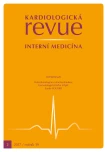-
Medical journals
- Career
Selected comments on the FOURIER study
Authors: M.vrablík
Authors‘ workplace: Centrum preventivní kardiologie, III. interní klinika 1. LF UK a VFN v Praze
Published in: Kardiol Rev Int Med 2017, 19(2): 118-122
Overview
The FOURIER study included 27,564 very high-risk cardiovascular patients and in a well-designed and conducted study tested an anti-PCSK9 monoclonal antibody – evolocumab – against placebo on the background of optimised contemporary cardiovascular therapy. The study ended after a median follow-up of 2.2 year with a positive impact on the primary (HR 0.85) as well as secondary (HR 0.80) endpoints. Safety analysis did not show any unexpected risks and the therapy was very well tolerated by the study subjects. The results of the study provide a vast amount of material that helps us define the place of evolocumab and PCSK9 inhibitors in the treatment of patients at high and very high cardiovascular risk. Of course, we can expect a number of subsequent analyses of the data to be published and discussed as they become available. As of today, we have already seen a number of questions related to the FOURIER study results, some of which will be discussed in this paper.
Keywords:
evolocumab – FOURIER – PCSK9 inhibition – LDL-cholesterol – myocardial infarction – stroke – mortality
Sources
1. Soška V, Vrablík M, Bláha V et al. PCSK9 inhibitory: nové možnosti v léčbě hypercholesterolemie. U koho budou indikovány? Vnitř Lek 2016; 62(4): 329 – 333.
2. Sabatine MS, Giugliano RP, Keech AC et al. Evolocumab and clinical outcomes in patients with cardiovascular disease. N Engl J Med 2017; 376(18): 1713 – 1722. doi: 10.1056/ NEJMoa1615664.
3. Robinson JG, Ray KK. Counterpoint: low-density lipoprotein cholesterol targets are not needed in lipid treatment guidelines. Arterioscler Thromb Vasc Biol 2016; 36(4): 586 – 590.
4. Sabatine MS, Giugliano RP, Wiviott SD et al. Efficacy and safety of evolocumab in reducing lipids and cardiovascular events. N Engl J Med 2015; 372 : 1500 – 1509. doi: 10.1056/ NEJMoa1500858.
5. Fulcher J, O'Connell R, Voysey M et al. Cholesterol Treatment Trialists' (CTT) Collaboration. Efficacy and safety of LDL-lowering therapy among men and women: meta-analysis of individual data from 174,000 participants in 27 randomised trials. Lancet 2015; 385(9976): 1397 – 1405. doi: 10.1016/ S0140-6736(14)61368-4.
6. Laufs U, Descamps OS, Catapano AL et al. Understanding IMPROVE-IT and the cardinal role of LDL-C lowering in CVD prevention. Eur Heart J 2014; 35(30): 1996 – 2000. doi: 10.1093/ eurheartj/ ehu228.
7. Cannon CP, Blazing MA, Giugliano RP et al. Ezetimibe added to statin therapy after acute coronary syndromes. N Engl J Med 2015; 372(25): 2387 – 2397. doi: 10.1056/ NEJMoa1410489.
8. Seidah NG. PCSK9 as a therapeutic target of dyslipidemia. Expert Opin Ther Targets 2009; 13(1): 19 – 28. doi: 10.1517/ 14728220802600715.
9. Giugliano RP, Mach F, Zavitz K et al. EBBINGHAUS: A cognitive study of patients enrolled in the FOURIER Trial. 66th ACC Sessions, 2017.
10. Goldstein LB, Amarenco P, Szarek M et al. Hemorrhagic stroke in the Stroke Prevention by Aggressive Reduction in Cholesterol Levels study. Neurology 2008; 70(24): 2364 – 2370.
Labels
Paediatric cardiology Internal medicine Cardiac surgery Cardiology
Article was published inCardiology Review

2017 Issue 2-
All articles in this issue
- Treatment of hypertension in the old and very old
- Control of blood pressure in primary and secondary prevention of stroke
- Endocrine hypertension
- The relation between blood pressure and pain – what do we know already?
- Selected comments on the FOURIER study
- Implementation of Guidelines for Diagnosis and Treatment of Heart Failure 2016 in clinical practice – the role of ivabradine
- Pharmacotherapy of heart failure with preserved ejection fraction
- Electrocardiogram and cardiac stimulation
- Target blood pressure values in heart failure
- New fixed antihypertensive combinations
- Hypertension and heart failure
- Hypertension and ischaemic heart disease – dangerous siblings
- Cardiology Review
- Journal archive
- Current issue
- Online only
- About the journal
Most read in this issue- Target blood pressure values in heart failure
- New fixed antihypertensive combinations
- Electrocardiogram and cardiac stimulation
- Pharmacotherapy of heart failure with preserved ejection fraction
Login#ADS_BOTTOM_SCRIPTS#Forgotten passwordEnter the email address that you registered with. We will send you instructions on how to set a new password.
- Career

